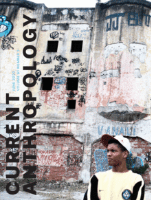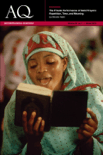
Lares-Quadrimestrale di Studi Demoetnoantropologici
Scope & Guideline
Fostering Insight into the Intersections of Culture and Society
Introduction
Aims and Scopes
- Cultural Anthropology and Ethnology:
The journal publishes research on cultural practices, social structures, and the lived experiences of individuals within diverse communities, particularly in the Mediterranean region. - Food Studies and Informal Economies:
A significant focus is placed on the analysis of food consumption, production, and informal economic activities, exploring how these elements reflect and shape cultural identities. - Political Activism and Social Movements:
Research often addresses themes of political activism, land rights, and community organizing, reflecting contemporary issues in rural and urban settings. - Memory and Nostalgia:
The journal explores how memory and nostalgia influence cultural practices and identities, particularly in relation to rural imaginaries and collective histories. - Interdisciplinary Approaches:
Contributions often utilize interdisciplinary methodologies, combining insights from history, sociology, and anthropology to provide a holistic understanding of cultural phenomena.
Trending and Emerging
- Informal Economies and Local Food Systems:
Recent publications highlight the significance of informal economies and local food systems, addressing their role in community resilience and cultural identity. - Rural and Urban Interactions:
A growing interest in the dynamics between rural and urban spaces is evident, with research exploring how these interactions shape social, economic, and cultural landscapes. - Environmental and Land Activism:
Themes of environmental sustainability and land activism are becoming more prominent, reflecting a global concern for ecological issues and community rights. - Digital Anthropology and Social Media:
There is an increasing focus on the impact of digital technologies and social media on cultural practices and identities, revealing new avenues for anthropological inquiry. - Memory Studies and Collective Identity:
The exploration of memory and its role in shaping collective identities is emerging as a key theme, particularly in relation to nostalgia and cultural heritage.
Declining or Waning
- Traditional Folklore Studies:
While still relevant, traditional folklore studies have seen a decrease in the number of publications, as the journal increasingly emphasizes contemporary cultural practices and their socio-political implications. - Historical Anthropology:
Research focused primarily on historical contexts and past events is waning, as the journal pivots towards examining current cultural dynamics and their impact on society. - Fascism and Colonialism Studies:
Although the journal has published significant works on fascism and colonialism in the past, there appears to be a reduction in this thematic focus, as newer research explores broader cultural and social issues. - Ethnographic Methodologies in Isolation:
There is a noticeable decline in papers that emphasize ethnographic methodologies conducted in isolation, with a growing trend towards collaborative and participatory approaches.
Similar Journals

Revista de Etnografie si Folclor-Journal of Ethnography and Folklore
Unraveling the Threads of Ethnographic KnowledgeRevista de Etnografie si Folclor-Journal of Ethnography and Folklore, an esteemed publication by EDITURA ACAD ROMANE, serves as a vital platform for the dissemination of research and scholarship in the fields of anthropology and cultural studies. Established in Romania, this journal has committed itself to exploring the rich tapestry of ethnographic practices and folklore traditions, favoring interdisciplinary approaches that illuminate the diverse cultural heritage of societies. With an ISSN of 0034-8198, the journal has been instrumental in fostering academic dialogue and engaging researchers, professionals, and students alike. Though currently classified in the Q4 category of both anthropology and cultural studies, its continued growth from 2014 to 2024 signals an evolving contribution to understanding cultural dynamics. Accessible via traditional publication means, the journal encourages contributions that deepen the understanding of ethnographic methodologies and cultural narratives, thereby enriching the academic landscape.

NEW MEXICO HISTORICAL REVIEW
Charting the Course of New Mexico's Historical ScholarshipWelcome to the New Mexico Historical Review, a premier scholarly journal dedicated to advancing the study of history within the cultural context of New Mexico and beyond. Published by the University of New Mexico, this journal features a wide array of peer-reviewed articles that explore historical narratives, regional studies, and interdisciplinary research in the field of history. With a commitment to scholarly excellence, the journal contributes significantly to the historical dialogue, reflected in its Scopus ranking within the 20th percentile among peers in the Arts and Humanities category. Although it currently does not offer Open Access options, the New Mexico Historical Review aims to engage researchers, professionals, and students alike by providing a platform for critical discourse and innovative perspectives on historical themes. Explore its rich history of publication, with a continuous release since the late 1970s, and discover how it has shaped the understanding of the intricate tapestry of New Mexico's past.

INTERNATIONAL JOURNAL OF AFRICAN HISTORICAL STUDIES
Charting New Territories in African Historical ScholarshipInternational Journal of African Historical Studies is a leading academic journal published by the African Studies Center at Boston University. With its ISSN 0361-7882 and E-ISSN 2326-3016, this journal serves as a vital platform for scholarly discourse in the fields of History, Cultural Studies, and Sociology. Renowned for its rigorous peer-reviewed research, the journal holds a commendable Q1 ranking in History and Q2 in Cultural Studies as of 2023, highlighting its influence and contribution to African historical scholarship. The journal has been published since 1976, consistently providing insightful analyses and critical research that engage with Africa's past and present, thereby enriching our understanding of global histories. Although it does not offer an open-access model, the journal is accessible through various academic databases and institutions. Its mission is to foster a deeper understanding of African histories by publishing high-quality, innovative research that reflects diverse perspectives, making it an essential resource for researchers, professionals, and students dedicated to the study of African history and cultural dynamics.

Revista Espanola de Antropologia Americana
Championing Original Research in Cultural FrameworksRevista Española de Antropología Americana, published by UNIV COMPLUTENSE MADRID, SERVICIO PUBLICACIONES, stands as a significant contribution to the field of anthropology, particularly focusing on American societies and cultures. Since its inception in 1970, this journal has evolved, with issues currently being published until 2024, providing a platform for original research, reviews, and scholarly discourse. Despite being a Q3 category journal in the 2023 rankings, it plays a pivotal role in disseminating knowledge and stimulating academic debate within the anthropology community. With an ISSN of 0556-6533 and an E-ISSN of 1988-2718, Revista Española de Antropología Americana strives to engage researchers, professionals, and students with insightful content that reflects the dynamic nature of cultural studies. Although it operates under traditional access models, the rich array of topics covered ensures its relevance to ongoing scholarly conversation in social sciences and anthropology. Addressing a diverse array of anthropological themes, this journal is essential for anyone looking to deepen their understanding of the cultural frameworks shaping American societies.

Lusotopie
Advancing Knowledge in Lusophone StudiesLusotopie is a distinguished academic journal dedicated to the exploration of cultural, social, and political dynamics in Lusophone societies, providing a pivotal platform for researchers and scholars in the fields of anthropology, history, and cultural studies. Published by Lusotopie, the journal features contributions that foster a deeper understanding of the linguistic, historical, and cultural connections across Portuguese-speaking communities, making it an essential resource for academics and professionals alike. With its ISSN 1257-0273 and E-ISSN 1768-3084, the journal aims to bridge interdisciplinary gaps while promoting critical discourse in the study of Lusophone regions. Although Lusotopie does not operate under an open access model, it remains committed to enhancing scholarly dialogue and disseminating significant research findings. The journal has cultivated a reputation for publishing quality articles, researched during its active years since 1999, thereby securing its place as an important contributor to the academic landscape of Mediterranean studies. Researchers, professionals, and students interested in the cultural intricacies and sociopolitical issues facing the Lusophone world will find Lusotopie an invaluable resource.

CURRENT ANTHROPOLOGY
Pioneering Discussions in Cultural ResearchCURRENT ANTHROPOLOGY, published by the esteemed University of Chicago Press, stands as a premier journal in the fields of anthropology and archaeology, with an impressive impact factor that signifies its relevance and authority in the academic community. With both print (ISSN: 0011-3204) and digital formats (E-ISSN: 1537-5382), this journal provides a platform for groundbreaking research, theoretical advancements, and critical discussions that shape our understanding of human cultures and societies. Since its inception in 1962, CURRENT ANTHROPOLOGY has continually pushed the boundaries of knowledge and inquiry, earning a prestigious Q1 ranking in 2023 across multiple categories, including Social Sciences and Archaeology. Researchers and professionals alike rely on this journal not only for its rigorous peer-reviewed articles but also for its commitment to interdisciplinary approaches and innovative methodologies. While not currently offering open access, CURRENT ANTHROPOLOGY remains an essential resource for students and scholars eager to stay abreast of the latest developments in anthropological research.

ANTHROPOLOGICAL QUARTERLY
Fostering Interdisciplinary Dialogues in the Arts and HumanitiesANTHROPOLOGICAL QUARTERLY, published by the George Washington University Institute of Ethnographic Research, stands as a vital resource in the field of anthropology and broader arts and humanities studies. With an ISSN of 0003-5491 and an E-ISSN of 1534-1518, this esteemed journal has been contributing to academic discourse since its establishment in 1981. The journal holds a respected position in both the Q2 category for Anthropology and the Q2 category for Arts and Humanities (miscellaneous), demonstrating its impact and relevance, as evidenced by its rank of #152 out of 502 in the Social Sciences sector for anthropology and rank of #179 out of 552 in the Arts and Humanities field. Researchers, professionals, and students can rely on ANTHROPOLOGICAL QUARTERLY for rigorous peer-reviewed articles that push the boundaries of ethnographic research and anthropological theory, addressing contemporary issues with scholarly precision. The journal’s commitment to fostering critical analysis and interdisciplinary perspectives establishes it as an essential platform for advancing knowledge within its diverse and dynamic field.

Slovensky Narodopis-Slovak Ethnology
Unveiling Ethnological Insights from SlovakiaSlovensky Narodopis-Slovak Ethnology is a leading academic journal dedicated to the exploration of ethnology and cultural studies, published by the Slovak Academy of Sciences at the Institute of Ethnology. With an Open Access policy since 2013, it strives to make high-quality research readily accessible to a global audience, enhancing the dialogue around Slovak cultural heritage and broader anthropological topics. The journal holds a notable position in the field, currently ranked Q2 in anthropology for 2023, indicating its substantial contribution to the discipline. It is indexed in Scopus, with a current rank of 245 out of 502 in the Social Sciences category, reflecting its value within the academic community. Researchers and students alike can look forward to a rich array of original research articles, reviews, and essays that not only delve into Slovak ethnology but also engage with international perspectives, thereby enriching the understanding of cultural dynamics and practices.

Anthropology in Action-Journal for Applied Anthropology in Policy and Practice
Transforming Insights into Actionable ChangeAnthropology in Action - Journal for Applied Anthropology in Policy and Practice, published by BERGHAHN JOURNALS, stands as a pivotal resource within the field of applied anthropology, addressing vital issues at the intersection of cultural insights and policy development. With an impressive Q1 ranking in Anthropology and a noteworthy position in the Scopus Ranks (Rank #70 of 502), this journal has solidified its influence as a premier platform for scholars and practitioners seeking to engage with contemporary societal challenges through a rigorous anthropological lens. Since becoming Open Access in 2018, the journal has enhanced accessibility to its rich array of scholarly articles, making critical research findings available to a broader audience. Covering a spectrum of topics from community practice to inform policy-making, Anthropology in Action aims to foster cross-disciplinary dialogue and promote the practical application of anthropological insights for real-world change. Whether you are a researcher, policymaker, or student, this journal serves as an essential navigational tool in the evolving landscape of applied anthropology.

AMERICAN ETHNOLOGIST
Advancing Ethnological Insights Since 1974AMERICAN ETHNOLOGIST, published by Wiley, stands as a prominent platform in the field of anthropology, with a distinguished reputation underscored by its Q1 ranking in the 2023 Category Quartiles and a notable position in the 79th percentile among its peers. With its foundation dating back to 1974 and set to continue until 2024, this journal serves as a vital resource for researchers, practitioners, and students devoted to exploring cultural dynamics and social practices across diverse communities. The journal is characterized by its commitment to advancing theoretical discussions and empirical scholarship in ethnology and related disciplines. Targeted contributions include in-depth studies, critical reviews, and innovative methodologies that engage with pressing cultural issues. Although it does not offer Open Access, the journal’s rigorous peer-review process and high-impact articles ensure the dissemination of valuable insights, enhancing scholarly engagement and professional discourse. Its ISSN is 0094-0496 and E-ISSN is 1548-1425, emphasizing its dual format accessibility, which facilitates wider readership within the anthropology community.